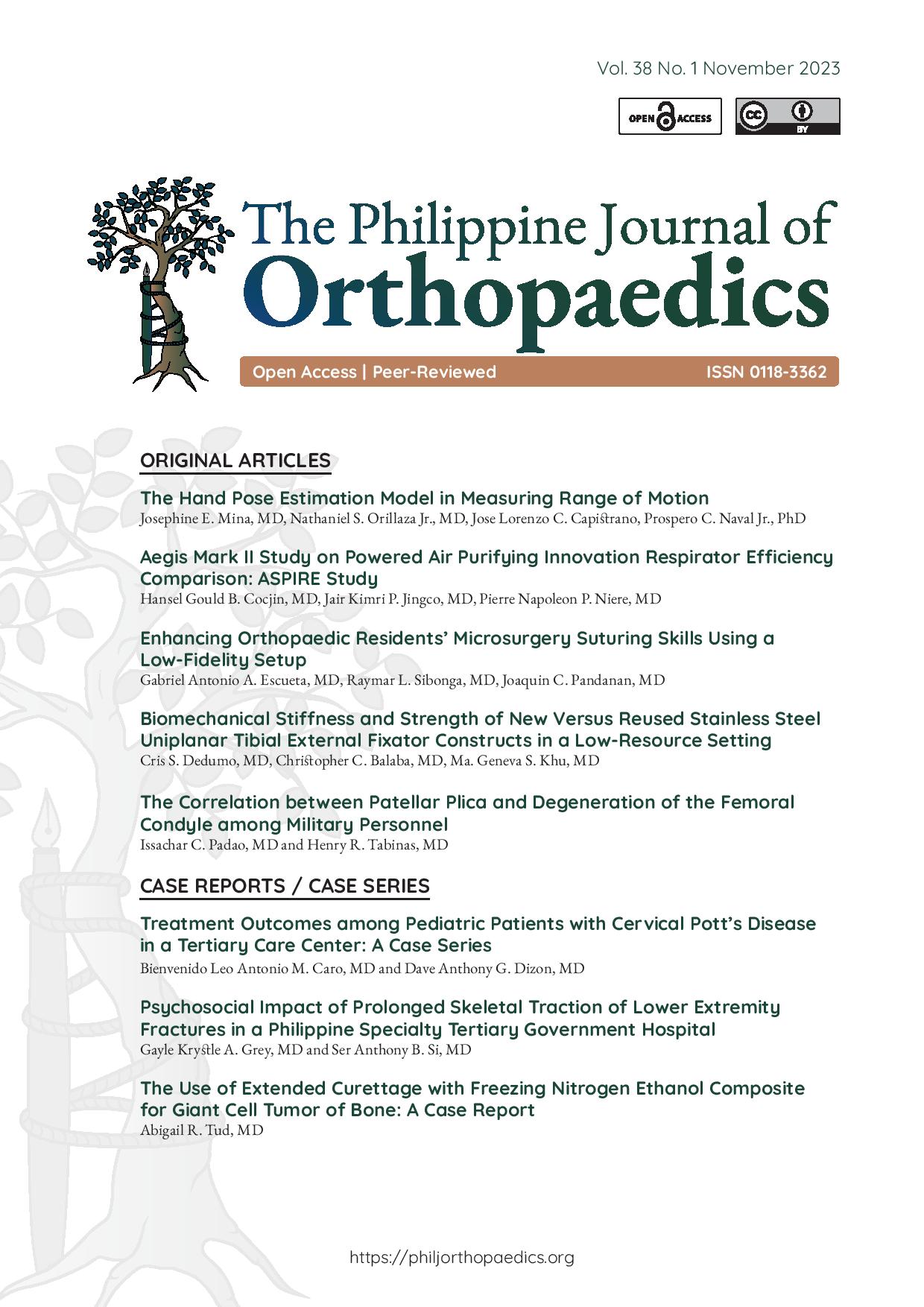Functional Outcome Measures after Operative Management of Acetabular Fractures
Main Article Content
Abstract
Objectives. This study evaluated the functional outcome of patients with acetabular injuries using the Majeed pelvic score. The specific objectives were to assess any differences in functional outcomes among patients treated with early versus delayed surgery and those with or without concomitant injuries.
Methodology. Patients from our institution, Baguio General Hospital and Medical Center, with acetabular injuries from January 2019 to December 2022, were included. Patients with acetabular fractures with or without other injuries were included. All available data sources were reviewed, such as charts from hospital records, patient census, and electronic medical records. Patients underwent physical therapy before discharge and were followed up. The patients’ outcomes after surgical intervention were assessed using Majeed's pelvic score.
Results. Thirteen patients were included in the study with follow-ups ranging from one to three years. A functional assessment using Majeed's pelvic score with a mean of 83 points (range 72–100). The majority had good functional outcomes.
Conclusions. Early surgical intervention may have no advantage over delayed surgeries regarding functional outcomes. However, concomitant injuries and complications may contribute to a poor to fair functional outcome.
Article Details

This work is licensed under a Creative Commons Attribution 4.0 International License.

This work is licensed under a Creative Commons Attribution 4.0 International License.
References
AlRousan FM, Almigdad AK, Jwinate MN, Aolymate MA, Alsarhan FY, Al-Qudah OM. A review of acetabular fracture patterns, etiologies, and management in Jordan. Saudi Med J. 2023;44(6):607–12. https://pubmed.ncbi.nlm.nih.gov/37343989 https://www.ncbi.nlm.nih.gov/pmc/articles/PMC10284221 https://doi.org/10.15537/smj.2023.44.6.20220931 DOI: https://doi.org/10.15537/smj.2023.44.6.20220931
Jindal K, Aggarwal S, Kumar P, Kumar V. Complications in patients of acetabular fractures and the factors affecting the quality of reduction in surgically treated cases. J Clin Orthop Trauma 2019;10(5):884–9. https://pubmed.ncbi.nlm.nih.gov/31528062 https://www.ncbi.nlm.nih.gov/pmc/articles/PMC6739298 https://doi.org/10.1016/j.jcot.2019.02.012 DOI: https://doi.org/10.1016/j.jcot.2019.02.012
Deo SD, Tavares SP, Pandey RK, El-Saied G, Willett KM, Worlock PH. Operative management of acetabular fractures in Oxford. Injury. 2001;32(7):581–6. https://pubmed.ncbi.nlm.nih.gov/11524093 https://doi.org/10.1016/s0020-1383(00)00200-x DOI: https://doi.org/10.1016/S0020-1383(00)00200-X
Matta JM. Fractures of the acetabulum: accuracy of reduction and clinical results in patients managed operatively within three weeks after the injury. J Bone Joint Surg Am. 1996;78(11):1632–45. https://pubmed.ncbi.nlm.nih.gov/8934477 DOI: https://doi.org/10.2106/00004623-199611000-00002
Letournel E. Acetabulum fractures: classification and management. Clin Orthop Relat Res. 1980;151:81–106. https://pubmed.ncbi.nlm.nih.gov/7418327 DOI: https://doi.org/10.1097/00003086-198009000-00012
Ghosh S, Aggarwal S, Kumar P, Kumar V. Functional outcomes in pelvic fractures and the factors affecting them- A short-term, prospective observational study at a tertiary care hospital. J Clin Orthop Trauma. 2019;10(5):896–9. https://pubmed.ncbi.nlm.nih.gov/31528064 https://www.ncbi.nlm.nih.gov/pmc/articles/PMC6739489 https://doi.org/10.1016/j.jcot.2018.08.001 DOI: https://doi.org/10.1016/j.jcot.2018.08.001
Ko SJ, O'Brien PJ, Broekhuyse HM, Guy P, Lefaivre KA. Which general functional outcome measure does a better job of capturing change in clinical status in pelvic and acetabular fracture patients? An analysis of responsiveness over the first year of recovery. OTA Int. 2021;4(3):e137. https://pubmed.ncbi.nlm.nih.gov/34746669 https://www.ncbi.nlm.nih.gov/pmc/articles/PMC8568449 https://doi.org/10.1097/OI9.0000000000000137 DOI: https://doi.org/10.1097/OI9.0000000000000137
Ayvaz M, Cağlar O, Yılmaz G, Güvendik GI, Acaroğlu RE. Long-term outcome and quality of life of patients with unstable pelvic fractures treated by closed reduction and percutaneous fixation. Ulus Travma Acil Cerrahi Derg. 2011;17(3):261–6. https://pubmed.ncbi.nlm.nih.gov/21935806 DOI: https://doi.org/10.5505/tjtes.2011.19052
Lumsdaine W, Weber DG, Balogh, ZJ. Pelvic fracture-specific scales versus general patient reported scales for pelvic fracture outcomes: a systematic review. ANZ J Surg. 2016;86(9):687–90. https://pubmed.ncbi.nlm.nih.gov/27283794 https://doi.org/10.1111/ans.13651 DOI: https://doi.org/10.1111/ans.13651
Majeed SA. Grading the outcome of pelvic fractures. J Bone Joint Surg Br. 1989;71(2):304–6. https://pubmed.ncbi.nlm.nih.gov/2925751 https://doi.org/10.1302/0301-620X.71B2.2925751 DOI: https://doi.org/10.1302/0301-620X.71B2.2925751
Singh A, Min Lim AS, Huh Lau BP, O'Neill G. Epidemiology of pelvic and acetabular fractures in a tertiary hospital in Singapore. Singapore Med J. 2022;63(7):388–93. Phttps://pubmed.ncbi.nlm.nih.gov/33721975 https://www.ncbi.nlm.nih.gov/pmc/articles/PMC9578124 https://doi.org/10.11622/smedj.2021024 DOI: https://doi.org/10.11622/smedj.2021024
Letournel E. Fractures of the cotyloid cavity, study of a series of 75 cases. J Chir (Paris). 1961;82:47–87. https://pubmed.ncbi.nlm.nih.gov/13761246
Judet R, Judet J, Letournel e. Fractures of the acetabulum: Classification and surgical approaches for open reduction. Preliminary report. J Bone Joint Surg Am. 1964; 46:1615–46. https://pubmed.ncbi.nlm.nih.gov/14239854 DOI: https://doi.org/10.2106/00004623-196446080-00001
Mardanpour K, Rahbar M. The outcome of surgically treated traumatic unstable pelvic fractures by open reduction and internal fixation. J Inj Violence Res. 2013;5(2):77–83. https://pubmed.ncbi.nlm.nih.gov/23103962 https://www.ncbi.nlm.nih.gov/pmc/articles/PMC3683417 https://doi.org/10.5249/jivr.v5i2.138 DOI: https://doi.org/10.5249/jivr.v5i2.138
Giannoudis PV, Grotz MRW, Papakostidis C, Dinopoulos H. Operative treatment of displaced fractures of the acetabulum. A Meta-Analysis. J Bone Joint Surg Br. 2005;87(1):2-9. https://pubmed.ncbi.nlm.nih.gov/15686228 DOI: https://doi.org/10.1302/0301-620X.87B1.15605
Borg, T. Pelvic ring injuries and acetabular fractures. Quality of life following surgical treatment. Acta Universitatis Upsaliensis. Digital comprehensive summaries of Uppsala dissertations from the Faculty of Medicine 2011;659:63.
Borg T, Berg P, Fugl-Meyer K, Larsson S. Health-related quality of life and life satisfaction in patients following surgically treated pelvic ring fractures. A prospective observational study with two years follow-up. Injury. 2010;41(4):400–4. https://pubmed.ncbi.nlm.nih.gov/20005513 https://doi.org/10.1016/j.injury.2009.11.006 DOI: https://doi.org/10.1016/j.injury.2009.11.006
Mbatha Sandile T, Duma Mlekeleli TN, Maqungo S, Marais LC. Complications of surgically managed pelvic and acetabular fractures. SA Orthop J. 2023;22(2):68–74. https://www.saoj.org.za/index.php/saoj/article/view/611 DOI: https://doi.org/10.17159/2309-8309/2023/v22n2a1
Ziran N, Soles GLS, Matta JM. Outcomes after surgical treatment of acetabular fractures: a review. Patient Saf Surg. 2019;16;13:6. https://pubmed.ncbi.nlm.nih.gov/30923570 https://www.ncbi.nlm.nih.gov/pmc/articles/PMC6420740 https://doi.org/10.1186/s13037-019-0196-2 DOI: https://doi.org/10.1186/s13037-019-0196-2
Matta JM, Anderson LM, Epstein HC, Hendricks P. Fractures of the acetabulum. a retrospective analysis. Clin Orthop Relat Res. 1986;(205):230–40. https://pubmed.ncbi.nlm.nih.gov/3698382 DOI: https://doi.org/10.1097/00003086-198604000-00029
Cole JD, Bolhofner BR. Acetabular fracture fixation via a modified Stoppa limited intrapelvic approach. Description of operative technique and preliminary treatment results. Clin Orthop Relat Res. 1994;(305):112–23. https://pubmed.ncbi.nlm.nih.gov/8050220 DOI: https://doi.org/10.1097/00003086-199408000-00015
Yeo DH, Oh JK, Cho JW, Kim BS. Management and Outcome of Patients with Acetabular Fractures: Associated Injuries and Prognostic Factors. J Trauma Inj. 2019;32(1):32–9. https://doi.org/10.20408/jti.2018.016 DOI: https://doi.org/10.20408/jti.2018.016
Katsoulis E, Giannoudis PV. Impact of timing of pelvic fixation on functional outcome. Injury. 2006;37(12):1133–42. https://pubmed.ncbi.nlm.nih.gov/17092504 https://doi.org/10.1016/j.injury.2006.07.017 DOI: https://doi.org/10.1016/j.injury.2006.07.017
Plaisier BR, Meldon SW, Super DM, Malangoni MA. Improved outcome after early fixation of
acetabular fractures. Injury. 2000;31(2):81–4. https://pubmed.ncbi.nlm.nih.gov/10748809 https://doi.org/10.1016/s0020-1383(99)00233-8 DOI: https://doi.org/10.1016/S0020-1383(99)00233-8
Johnson EE, Matta JM, Mast JW, Letournel E. Delayed reconstruction of acetabular fractures 21–120
days following injury. Clin Orthop Relat Res. 1994;(305):20–30. https://pubmed.ncbi.nlm.nih.gov/8050229 DOI: https://doi.org/10.1097/00003086-199408000-00004
Oransky M, Sanguinetti C. Surgical treatment of displaced acetabular fractures: Results of 50 consecutive cases. J Orthop Trauma. 1993;7(1):28–32. https://pubmed.ncbi.nlm.nih.gov/8433196 https://doi.org/10.1097/00005131-199302000-00006 DOI: https://doi.org/10.1097/00005131-199302000-00006





